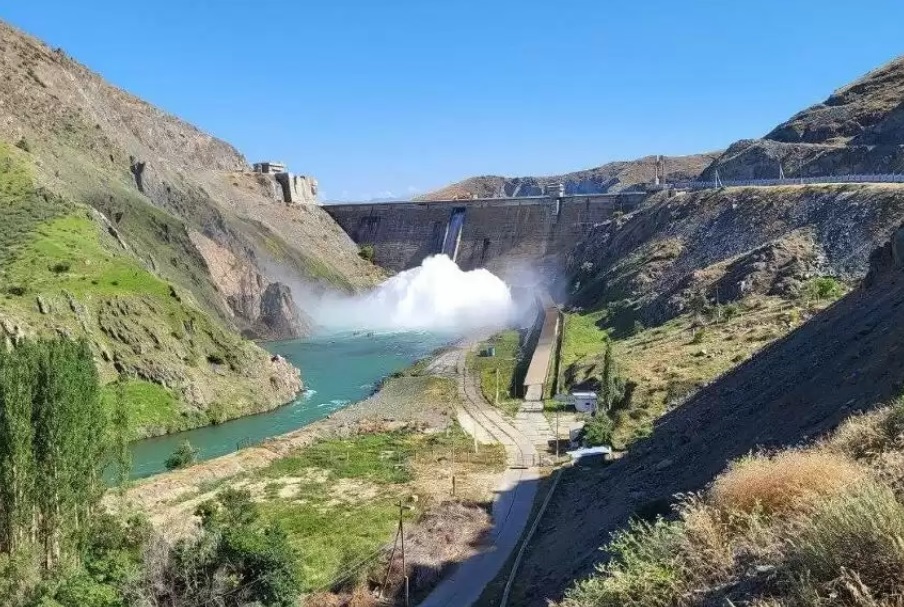Border tensions over water resources between Bishkek and Astana
The crisis in supplies due to drought is poisoning relations with Kazakhstan, whose sugar beet growers are facing ruin. Astana in protest is blocking borders to Kyrgyz commercial transports. Two countries that are historically and culturally very similar, but whose policies also often diverge in their relations with Moscow.
Astana (AsiaNews) - Due to the drought that has been going on for months now, Kyrgyzstan has so far been unable to supply the farmers who grow sugar beet in southern Kazakhstan with additional quantities of water, according to current agreements.
In turn, Astana is blocking the borders for Kyrgyz commercial transport, largely destined for Russia in a way to circumvent international sanctions. On the internet there are very anxious videos of Kazakh farmers, who risk ruin.
Not all farmers accuse Kyrgyzstan, which is also rather tried by climatic adversities, and many are angry with the regional authorities and those in Astana, who did not take the necessary countermeasures in time.
Bishkek's agriculture ministry, for its part, has issued statements according to which all commitments towards neighboring Kazakhs, whose border territories are downstream of the now dry waters of Kyrgyzstan, have been observed; as there is no reserve water, the Kyrgyz do not feel they bear responsibility for the situation.
According to the ministry's data, the Kirov reservoir in the northwestern part of the Talas region is currently at the level of 3 percent of its capacity, as confirmed by satellite images of the area.
Many Kyrgyz believe that Kazakhstan has decided to punish them anyway, with the blockade of the "Ak-Tilek", "Ken-Bulan" and other border crossings, where hundreds of vehicles have been stopped for some days now.
The truck drivers say that the Kazakh border guards lengthen checks on loads indefinitely, allowing a maximum of 5-6 cars to pass a day, when on average at least 20 pass an hour. Kazakh Deputy Prime Minister Erulan Žamaubaev told reporters that the Security Committee (KNB) is conducting an operation to combat drug trafficking along the country's borders, without clarifying how long it will last.
Tension was further increased on August 25 by the visit to Astana by Tajik President Emomali Rakhmon, Kyrgyzstan's main opponent in Central Asian policies. According to many observers, it would be a signal from Astana to express its dissatisfaction with Bishkek.
In fact, the situation is not new at all, and the struggle for water resources in these areas has in the past led to various alliances and differences between these countries; things had improved somewhat since 2016, with the coming to power in Uzbekistan of Šavkat Mirziyoyev, who had taken very peaceful positions on the issue, while his predecessor Islam Karimov was known for the opposite, even threatening armed conflicts for the access to cross-border resources.
Mirziyoyev himself had launched an appeal to his neighbors as early as April, due to the very negative forecasts on the summer climatic phase, and in Uzbekistan measures had been taken to save water reserves, those which according to the Kazakh farmers should also have taken the government of Astana.
Bishkek had warned the Kazakhs in talks earlier this summer, predicting serious water supply problems, and that they could not go beyond the minimum quotas of the agreements. No formal accusations against the Kyrgyz have arrived from the Kazakh authorities, but a report by the Astana ministry of ecology had nonetheless noted a non-correspondence in the declared levels of the Kyrgyz basins.
Kazakhstan and Kyrgyzstan are two historically and culturally very similar countries, but their policies are often divergent, and we recall the previous conflict in 2017, when the outgoing president of Bishkek, Almazbek Atambaev, had attacked Nursultan Nazarbaev, accusing him of meddling in ongoing electoral trials, calling him a “decrepit autocrat” and claiming that Kazakhstan's ruling clan robbed its own citizens.
The reaction then was very similar to today's: kilometer-long queues immediately formed at the borders, and the Kazakh services said they were waging "war against smugglers". Atambaev cheekily said that “the queues will disappear as soon as we turn off the taps in Kazakhstan for a couple of days”, but that was resolved pretty quickly.
Now some even suspect that behind the "water reticence" of the Kyrgyz there is the hand of Moscow, which in this way seeks to force the Kazakhs to collaborate more in circumventing the sanctions.
Photo: Kirov reservoir (gov.kz)







.png)










